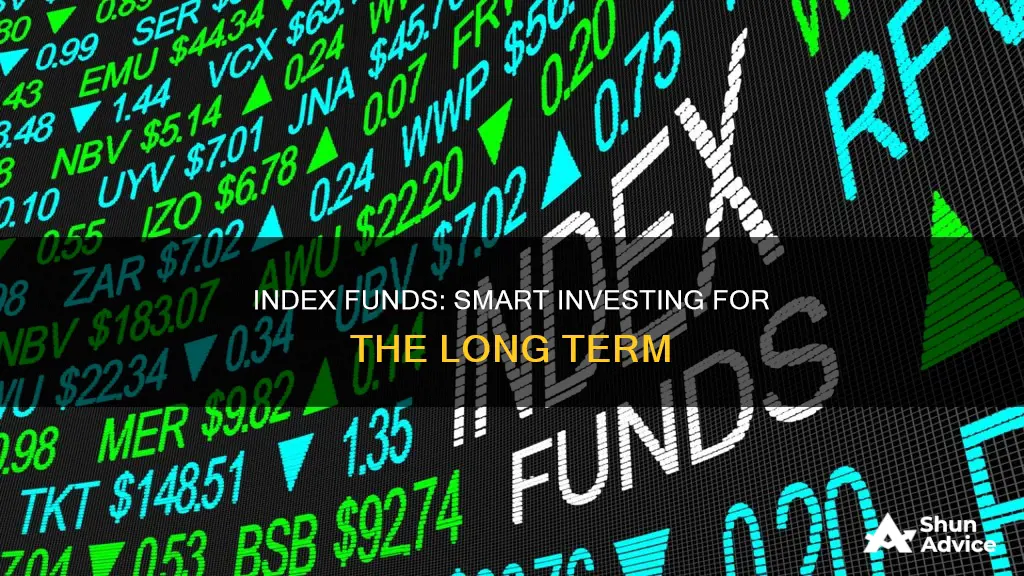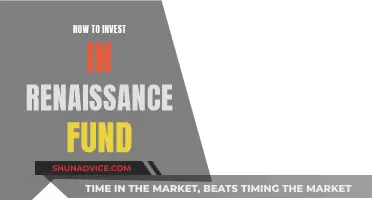
Index funds are a type of mutual or exchange-traded fund (ETF) that tracks the performance of a market index, such as the S&P 500, by holding the same stocks or bonds or a representative sample of them. Index funds are defined as investments that mirror the performance of benchmarks like the S&P 500 by mimicking their makeup. Index funds are a low-cost, easy way to build wealth. They are considered a passive management strategy and don't need to actively decide which investments to buy or sell. Index funds are often used to help balance the risk in an investor's portfolio, as market swings tend to be less volatile across an index compared to individual stocks.
| Characteristics | Values |
|---|---|
| Type of fund | Mutual or exchange-traded fund (ETF) |
| Investment strategy | Passive |
| Investment aim | To track the performance of a market index, e.g. S&P 500 |
| Management style | Not actively managed, no need to pick stocks or time trades |
| Costs | Low fees, low expense ratios |
| Returns | Typically outperform actively managed funds over the long term |
| Risk | Lower risk due to diversification, but vulnerable to market downturns |
| Suitability | Good for long-term investors, e.g. retirement savers |
What You'll Learn

Low fees and tax advantages
Index funds are a great investment vehicle for those seeking low-cost, diversified, and passive investment options that often outperform higher-fee, actively traded funds. Here are some key advantages related to their low fees and tax advantages:
Low Fees
Index funds are known for their low fees, which make them an attractive investment option. Here's why they have low fees:
- Passive Management: Index funds are passively managed, meaning they aim to replicate the performance of a specific market index. This passive approach eliminates the need for active fund managers, research analysts, and frequent trading, resulting in lower management fees.
- Lower Expense Ratios: Index funds typically have lower expense ratios compared to actively managed funds. These expense ratios represent the fees deducted from each shareholder's returns as a percentage of their investment.
- Lower Transaction Costs: Index funds have lower transaction costs because they trade less frequently than actively managed funds.
- Size of the Fund: Larger index funds tend to have lower fees due to economies of scale.
Tax Advantages
Index funds also offer tax advantages that can enhance your investment returns:
- Lower Capital Gains Taxes: Index funds generally have lower turnover rates, resulting in fewer capital gains distributions. This means you may owe less in taxes on your investment returns.
- Tax-Loss Harvesting: Index funds can take advantage of tax-loss harvesting strategies. When the fund sells a security at a loss, it can offset taxable capital gains, reducing the tax liability for shareholders.
- Efficient Portfolio Management: The passive nature of index funds leads to less frequent buying and selling, resulting in lower transaction costs and potentially lower capital gains taxes.
By investing in index funds, you benefit from a low-fee structure and tax advantages that can boost your overall investment returns over time. These features make index funds a compelling choice for cost-conscious investors.
ETFs: A Smart Investment Strategy for Your Money
You may want to see also

Passive management and broad diversification
Index funds are a type of passive investment strategy. Passive management, or passive investing, is a strategy that tracks a market-weighted index or portfolio. It is most common in the equity market, where index funds track a stock market index, but it is also used in other investment types, including bonds, commodities, and hedge funds.
Passive management aims to reduce the costs of selecting investments by simplifying the portfolio construction process and reducing fees triggered by frequent trading. It also benefits from economies of scale, as index mutual funds tend to be larger than actively managed funds.
Index funds are a common form of passive investing. They are a type of mutual or exchange-traded fund (ETF) that tracks the performance of a market index, such as the S&P 500, by holding the same stocks or bonds, or a representative sample of them. Index funds are designed to mirror the performance of their benchmark index, and they do this by holding a representative sample of the securities in that index. This means that index funds provide broad market exposure and diversification across various sectors and asset classes.
The benefits of passive management and broad diversification include:
- Lower costs: Passive funds have lower expense ratios because they are passively managed and do not require costly research.
- Market representation: Passive funds offer broad market exposure and diversification, which is beneficial for investors seeking a diversified investment that tracks overall market trends.
- Transparency: The holdings of passive funds are well-known and available on investing platforms.
- Historical performance: Over the long term, passive funds have often outperformed actively managed funds, especially after accounting for fees and expenses.
- Tax efficiency: Lower turnover rates in passive funds result in fewer capital gains distributions, making them more tax-efficient.
However, there are also some drawbacks to passive management and broad diversification:
- Lack of flexibility: Passive funds are designed to mirror a specific market, so they decline in value when the market does, and they cannot pivot away when the market shifts.
- Automatic inclusion of securities: Passive funds may invest in overvalued or weak companies, as they automatically include all the securities in an index.
- Market-cap weighting: This type of weighting can lead to a concentration in a few large companies, magnifying risks if these companies underperform.
- Lack of downside protection: In prolonged downtrends, passive funds can perform poorly in line with the broader market.
Spotting Junk Bond Funds: What Investors Should Know
You may want to see also

Long-term outperformance
Index funds are a great investment for long-term outperformance. They are a low-cost, easy way to build wealth, and their passive management strategy means they don't need to actively decide which investments to buy or sell. This makes them ideal for investors who want a more hands-off approach to investing.
Index funds aim to mirror the performance of a specific market index, such as the S&P 500, the Dow Jones Industrial Average, or the Nasdaq Composite. By investing in index funds, you benefit from the diversification of the underlying index, which typically includes a broad range of stocks or bonds. This diversification helps to reduce risk and can lead to solid returns over time.
One of the biggest advantages of index funds is their low cost. They have lower expense ratios because they are passively managed, and they don't require a large team of analysts and traders to pick stocks. As a result, index funds typically have lower fees than actively managed funds, which can lead to better returns for investors over the long term.
Additionally, index funds are tax-efficient. Their lower turnover rates result in fewer capital gains distributions, making them more tax-efficient than actively managed funds. This further contributes to their long-term outperformance.
When investing in index funds, it's important to consider your investment goals, the fees involved, and the level of diversification you want. While index funds are a great option for long-term outperformance, they may not be suitable for everyone, so it's essential to do your research and understand the risks involved.
Impact Investment Funds: Doing Well by Doing Good
You may want to see also

Lack of downside protection
Index funds are a type of mutual or exchange-traded fund (ETF) that tracks the performance of a market index, such as the S&P 500, by holding the same stocks or bonds or a representative sample of them. They are designed to replicate the performance of financial market indexes and are ideal for long-term investing.
However, one of the drawbacks of investing in index funds is the lack of downside protection. In other words, they lack the flexibility to pivot away from a declining market. When the market falls, index funds decline in value as well since they are designed to mirror a specific market. This means that investors in index funds are completely vulnerable when the market drops.
For example, if you have a fund that tracks the S&P 500, you will enjoy the gains when the market is doing well, but you will also experience losses when the market drops. In contrast, an actively managed fund may be able to sense a market correction and adjust or liquidate the portfolio's positions to buffer it.
The lack of downside protection in index funds can be a concern during prolonged downtrends, as these funds can perform poorly in line with the broader market. This means that investors in index funds may not have the same level of protection as those in actively managed funds during market downturns.
To address the lack of downside protection, investors in index funds may consider seeking professional advice from a financial advisor. By consulting with an advisor, investors can gain guidance on selecting a fund that aligns with their overall financial goals and risk tolerance. Additionally, diversifying across different markets and asset classes can help spread risk and potentially mitigate some of the downsides of investing solely in index funds.
Investing at 80: Vanguard Funds, a Wise Choice?
You may want to see also

Not a one-size-fits-all solution
Index funds are a popular investment choice, but they are not a one-size-fits-all solution. While they offer broad diversification and low fees, there are some potential drawbacks to consider.
Firstly, index funds are designed to mirror the performance of a specific market index, which means they lack flexibility. When the market declines, index funds decline in value as well, and they cannot pivot to alternative strategies. This passive approach can be a disadvantage during prolonged market downturns, as index funds may underperform compared to actively managed funds that have the ability to be more dynamic.
Additionally, index funds automatically include all the securities in an index, which may result in investing in overvalued or weak companies. This automated strategy has often outperformed active management, but it can potentially lead to suboptimal returns if the underlying companies underperform.
Another criticism of index funds is the use of market-cap weighting, where companies with higher market capitalizations have a more significant influence on the fund's performance. This concentration can increase the risk of being overly dependent on the fate of a few large companies.
Furthermore, index funds may not be suitable for those seeking to beat the market or achieve superior returns. By design, index funds aim to match the performance of a specific index rather than outperform it. Investors who want to actively select stocks and attempt to generate higher returns may find index funds limiting.
Lastly, while index funds are generally considered low-cost investments, it's important to carefully evaluate the fees associated with different index funds. Some index mutual funds may carry higher administrative costs, and the expense ratios can vary significantly between funds. It's crucial to consider these fees when making investment decisions.
In conclusion, while index funds offer benefits such as broad diversification and low costs, they may not be the ideal solution for all investors. It's important to understand the potential drawbacks and consider your financial goals, risk tolerance, and investment horizon before deciding whether index funds align with your investment strategy.
Best S&P Index Funds: Top Picks for Your Portfolio
You may want to see also
Frequently asked questions
Index funds are a low-cost, easy way to build wealth. They are passively managed, which means they don't need to actively decide which investments to buy or sell. Index funds are often used to help balance the risk in an investor's portfolio, as market swings tend to be less volatile across an index compared with individual stocks.
One drawback of index funds is their lack of flexibility. They are designed to mirror a specific market, so they decline in value when the market does, and they can't pivot away when the market shifts. They are also criticised for automatically including all the securities in an index, which may lead to investing in overvalued companies.
You can purchase an index fund directly from a mutual fund company or a brokerage. You'll need to open an investment account, such as a brokerage account, individual retirement account (IRA) or Roth IRA.
Some popular index funds include the Vanguard S&P 500 ETF, Vanguard Total Stock Market, Vanguard Total International Stock Market and Vanguard Total Bond.







